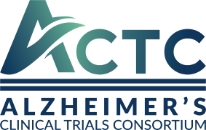Test Committees

Jeffrey L. Cummings, MD, ScD
Neuropsychiatric Symptoms (NPS),Cleveland Clinic Lou Ruvo Center for Brain Health

David S. Geldmacher, MD, FACP
Site Metrics and Study Budgets Committee (SMSBC),University of Alabama at Birmingham

Jason Karlawish, MD
Internal Ethics Committee,Perelman School of Medicine, University of Pennsylvania, Penn Memory Center

Athene Lee, PhD
Early-Career Project Evaluation Committee,Brown University Alpert Medical School, Butler Hospital Memory and Aging Program

Gad Marshall, MD
Publications Committee,Center for Alzheimer Research and Treatment, Brigham and Women's Hospital, Massachusetts General Hospital, Harvard Medical School

Rema Raman, PhD
Early-Career Project Evaluation Committee,University of Southern California Alzheimer’s Therapeutic Research Institute (USC ATRI)

Sarah Walter, MSc
Research Participant Advisory Board,University of Southern California, Alzheimer’s Therapeutic Research Institute (USC ATRI)
Biospecimen Allocation Review Committee (BARC)
Chairs: Thomas Montine, MD,The ACTC BARC is an independent committee, appointed by the NIA (which determines its policies, rules, and functions).
Early-Career Project Evaluation Committee
Chairs: Athene Lee, PhD, Rema Raman, PhD,The Early Career Project Evaluation Committee (Early Career PEC) is a sub-committee of the Inclusion, Diversity and Education in Alzheimer’s disease – Clinical Trials (IDEA-CT) Committee, charged with enhancing inclusion and training of early career investigators and professionals in protocol review and development within ACTC. The Early Career PEC reports to the IDEA-CT leadership and works in partnership with the ACTC PEC committee to promote the following aims:
- Enhance inclusion of early career investigators and professionals in ACTC scientific operations, by way of providing a platform for early career members to contribute to evaluating and selecting ACTC sponsored projects.
- Train early career investigators and professionals in ADRD protocol review and development through guided project evaluation meetings with mentorship from seasoned investigators.
- Provide a pathway to become members of the ACTC PEC and NIH clinical trial study sections in the future.
Executive Committee
The Executive Committee is a standing ACTC committee responsible for overseeing ACTC and advising leadership on key decisions. The committee has the following aims: to review governance and communications issues, to review the progress and discuss any challenges in ongoing ACTC trials, to make recommendations to ACTC Leadership.
Internal Ethics Committee
Chairs: Jason Karlawish, MD, Joshua Grill, PhD,The Internal Ethics Committee is a standing ACTC committee. The IEC monitors and manages the financial relationships of ACTC participants who have a role in protocol selection, development and data analyses. This includes ACTC Steering Committee members, advisors, unit leads and selected unit members, and PEC members. Relationships include industry ties and intellectual property holdings. The IEC develops policies to address these relationships and provides the ACTC investigators, staff and collaborators with ethics education and consultation. The committee has the following aims:
- Management of industry and property relationships: Guided by the “ACTC Internal Ethics Committee Guidance on Financial Relationship Disclosure and Management,” early in the review of potential ACTC protocols, the IEC reviews disclosures to determine whether a relationship presents a conflict of interest, and, if so, how to manage the conflict of interest. Similarly, prior to each SC meeting, the IEC will review disclosures and work with the ACTC PIs and according members to manage conflicts of interest.
Neuropsychiatric Symptoms (NPS)
Chairs: Jeffrey L. Cummings, MD, ScD,The Neuropsychiatric Disorders Committee (NDC) is a standing ACTC committee with the following aims:
- Advise on trial design for studies of agents, devices, or non-pharmacologic interventions targeting neuropsychiatric symptoms (NPS) such as agitation, psychosis, depression, apathy, and sleep disorders.
- Assist in designing trials for non-AD dementia such as frontotemporal dementia and dementia with Lewy bodies where behavioral symptoms are prominent.
Non-AD Dementia Committee
Chairs: Bradley Boeve, MD, Adam Boxer, MD,The Non-Alzheimer’s Disease (AD) Dementia Committee is a standing ACTC committee with the aim of advising on trial design for studies where the population is non-AD age-related dementia.
Non-Pharmacological Intervention Committee
Chairs: Laura Baker, PhD, Bruno Vellas, MD,The Non-Pharmacological Committee is a standing ACTC committee that provides expertise and guidance in the development and management of trials involving non-pharmacological approaches in clinical trials. The committee has the following aims:
- Advise on trial design for studies that include non-pharmacological interventions or assessments focused on physical exercise, cognitive/social stimulation, diet/nutrition and other exposures proposed to impact AD risk or trajectory (e.g., sleep, light, toxins).
Project Evaluation Committee (PEC)
Chairs: Christopher van Dyck, MD, Ron Petersen, MD, PhD,The Project Evaluation Committee is a standing ACTC committee that performs preliminary evaluation of proposals submitted to the ACTC for scientific merit, feasibility, and appropriateness. The PEC votes on which proposals should be referred to the ACTC Steering Committee. Prepares feedback for proposers.
Publications Committee
Chairs: Gad Marshall, MD,The Publications Committee is a standing ACTC committee that is in place to assure that any publications using data from ACTC-affiliated studies accurately report analyses and interpretation of results of complete datasets for primary and secondary analyses. The committee will assure that publications represent the given study in the Methods section and appropriately acknowledge ACTC. The committee will make sure that appropriate conflicts of interest are reported in publications and intervene with journal editors when necessary. Finally, the committee will track all publications using ACTC data. We will strive to have diverse representation in the committee, including women and under-represented minorities. The committee has the following aims:
- Establish publication and authorship procedures for reviewing all contents of manuscripts of primary and secondary analyses, including accurate analyses and interpretation of results of complete datasets (efficacy and safety for clinical trials and reliability and validity for instruments/outcome measures), comprehensive description of human subjects’ issues, conflicts of interest disclosure, and authorship. This review will also address the appropriate inclusion of analyses of sex/gender and race/ethnicity differences and appropriate inclusion of authors who are women and/or underrepresented minorities. Dr. Neelum Aggarwal, who is a member of the Publications Committee and co-chair of the Inclusion, Diversity, and Education in Alzheimer’s disease Clinical Trials (IDEACT) Outreach and Policy Sub-committee will facilitate this review.
- Review each manuscript and conference abstract content (including primary and secondary analyses manuscripts and subsequent manuscripts using data that is publicly available) to ensure accurate representation of the study, data collected, analyses, and interpretation.
- Review each manuscript for appropriate authorship listing.
- Review each manuscript for compliance with ACTC-affiliated studies description and acknowledgement.
- Track publications using ACTC data.
- Review conflicts of interest within publications. This will take place in conjunction with the Internal Ethics Committee review. Dr. Gregory Jicha is a member of both committees and will streamline this dual review.
- Intervene with journal editors when necessary
Research Participant Advisory Board
Chairs: Sarah Walter, MSc,The ACTC Research Participant Advisory Board is a standing advisory board that provides guidance to the consortium to help ensure that the outcomes of ACTC work are meaningful to the public. The committee has the following aims:
- Provide guidance on study design including the following areas: ethical considerations, disclosure of personal and study research results, privacy, recruitment approaches that engage diverse communities and increase trial generalizability, burden for participants and study partners, and selection of therapeutics, balancing risk and potential benefit
- Provide feedback on network conduct: data sharing, reporting topline results, sharing results and assignments with participants, and network priorities
Site Metrics and Study Budgets Committee (SMSBC)
Chairs: David S. Geldmacher, MD, FACP, Suzanne Craft, PhD,The Site Metrics and Study Budget Committee is a standing ACTC committee that will be responsible for advising the PIs and Steering Committee on measures of site performance (e.g., enrollment, screen failure rates, retention) and assist ACTC administration in determining appropriate budgetary allocations for protocol activities. Diversity considerations for the membership include gender, ethnicity, geographic/regional representation, career phase, and site role. The committee has the following aims:
- To develop and implement a system of metrics for evaluating site performance to identify areas of strengths and opportunities for improvement, and to facilitate the development of strategies to optimize site performance.
- To develop the requirements for becoming an ACTC Member site and standards for retaining ACTC membership and infrastructure support.
Site Process Improvement, Networking, and Support Committee (SPINS)
Chairs: Molly Harper, MSc, CCRP,Recognizing that Site Research Managers and Study Coordinators are a critical component of AD clinical trial infrastructure, and that these roles require a special set of skills and need for support and training, this committee aims to improve infrastructure for AD clinical trials through the following:
- To provide support and mentorship specific to Alzheimer’s disease clinical trials for Site Research Managers and Study Coordinators, with a focus on early-career study coordinators, through: establishing networking opportunities at both remote and in person meetings and conferences (e.g. ACTC Steering Committee meetings, Investigator Meetings, AAIC and CTAD), establishing programs for site-to-site resource and knowledge sharing, and providing feedback to ACTC Steering Committee and leadership on how to best support training and career development.
- To improve site processes and study implementation through: identifying, establishing, and disseminating best practices for site and coordinating center processes, including training and communication within a study, defining and characterizing clinical trial site research center organizational structures to allow development of methods to best support sites based on shared characteristics, providing the perspective of frontline research personnel during the design of ACTC studies and initiatives while also serving as a resource for other ACTC Committees and Units (e.g. Site metrics, IDEA-CT, Clinical Outcome instrument unit), and providing feedback to ACTC Steering Committee and leadership on how to improve site processes and study implementation.
- To inform the field of AD clinical trials and specifically activities undertaken by ACTC, by generating research questions utilizing existing ACTC datasets or newly acquired data, if needed, that evaluate trial conduct and site processes. Disseminate findings at ACTC Steering committee meetings and/or scientific conferences.
- As the field evolves, identify other needs and support opportunities for site staff to improve critical trial processes.
Steering Committee
The Steering Committee is comprised of the Principal Investigator from each of the 35 member sites, the Leads from each of the working Units of ACTC, and the NIA Project Scientist and Program Official (ex-officio).










